The Weight of Poverty in Pataliputra
In the ancient, bustling city of Pataliputra, there lived a trader named Vikram, a man whose piety and good nature were as renowned as the fortune he had inherited. His generosity was a familiar shade in the city’s heat, a man known to give alms to the poor with the same earnestness he applied to his prayers. But the wheel of fate turns on an unpredictable axis. The wealth that had flowed through his family for generations slowed to a trickle and then ran dry. The same kinsmen who once crowded his courtyard, their laughter echoing off walls of prosperity, now averted their eyes in the marketplace. Their silence was not pity, but a quiet, relentless disgrace.
A Divine Vision in the Dark of Night
One night, the weight of this silence pressed down upon him in the cavernous emptiness of his bedchamber. “What a cruel alchemy is this,” he whispered into the darkness, “that gilds a man’s vices with gold and tarnishes his virtues with poverty? A rich fool is a philosopher; a poor saint is a nuisance. I have become a ghost in my own life, a non-entity to the very blood that should be my strength. To continue this charade is a disgrace. It would be better to cease existing on this planet than to live as a phantom in my own skin.”
Succumbing to an exhausted slumber, his mind, a fertile ground for despair, conjured a vision. A saint, luminescent and serene, appeared before him. “Do not lose heart, son of honest men,” the apparition spoke, its voice a balm. “I am the living embodiment of the treasure your forefathers earned not through cunning, but through integrity. At the first light, I will come to your door in this form. You must strike my head with a club. Do not fear, for I will transform into a statue of pure gold. Use it to rebuild your legacy. But remember—the metal will hold its value only so long as your dealings hold their honesty.”
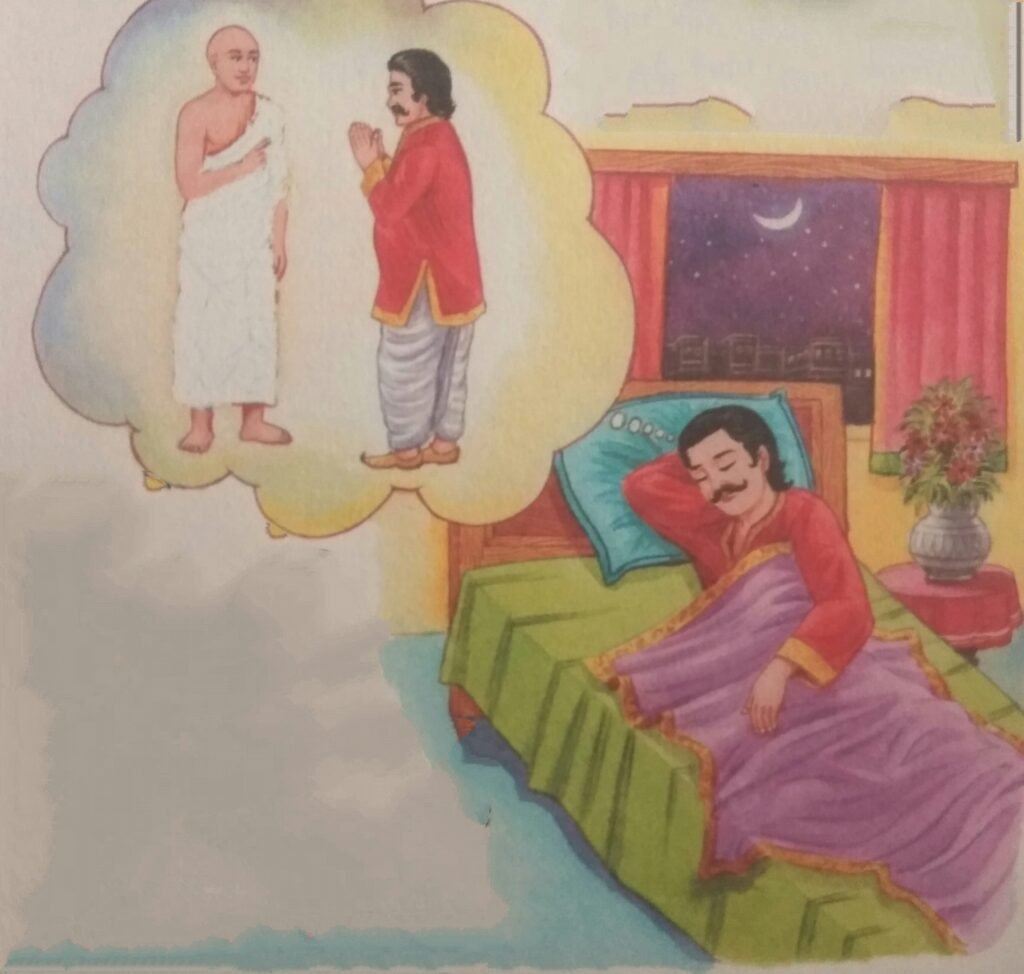
The Miracle at the Doorstep
Dawn broke, not with hope, but with the grey, familiar weight of reality. Vikram woke, the saint’s words echoing in the silent room, already feeling like foolish phantoms. He shared the “weird dream” with his wife over a meager breakfast, his tone laced with self-mockery. “Grief and worry are fertile ground for the mind’s cruelest tricks,” he sighed, dismissing the vision as a desperate fiction, a symptom of his unraveling spirit. Yet, throughout the morning, the command—strike my head—recurred with the nagging persistence of a forgotten prayer, and each time he shook it away, a man fighting a haunting.
The morning’s mundanity arrived in the form of the neighborhood barber, summoned by Vikram’s wife to trim their young son’s hair. The snip-snip of scissors was about to provide a soundtrack of normalcy when a shadow fell across the doorway. There, silhouetted against the harsh sun, stood the saint. Not a memory, not a dream, but a man of flesh and light, his serene gaze fixed on Vikram.
Time seemed to slow, then snap into terrifying clarity. The dream was a prophecy. The command was a test. There was no time for prayer, no moment for second-guessing. A primal energy seized Vikram. His eyes fell upon a heavy wooden club leaning by the door, used to brace it against the wind. In one fluid, desperate motion, he swept it up, and with a cry that was part terror, part faith, he brought it down upon the saint’s head.
There was no sickening crunch, no spatter of blood. Instead, a sound like a great bell chiming, and a flash of blinding, golden light. Ho! Where the saint had stood, now lay a magnificent statue, its form radiating a warm, inner glow, the pure, untarnished gold cool against the dusty floor. Awe-struck and trembling, Vikram managed to drag the heavy, divine treasure into his strong-room, his mind reeling.
A Secret Sold, A Seed of Greed Sown
His senses returned with the sight of the barber, frozen in place, his shears hanging limply from his hand, his face a canvas of pure, uncomprehending shock. Vikram moved quickly. He shoved a heavy bag of coins—a small fortune to the barber—into the man’s hands, his voice low and intense. “What you saw here today,” Vikram whispered, gripping the man’s arm, “never passed these walls. It was a trick of the light, a private matter. You understand?” The barber, his eyes wide, nodded dumbly, the weight of the coins and the secret settling upon him. He scurried away, his heart pounding not with fear, but with a dizzying, covetous joy.
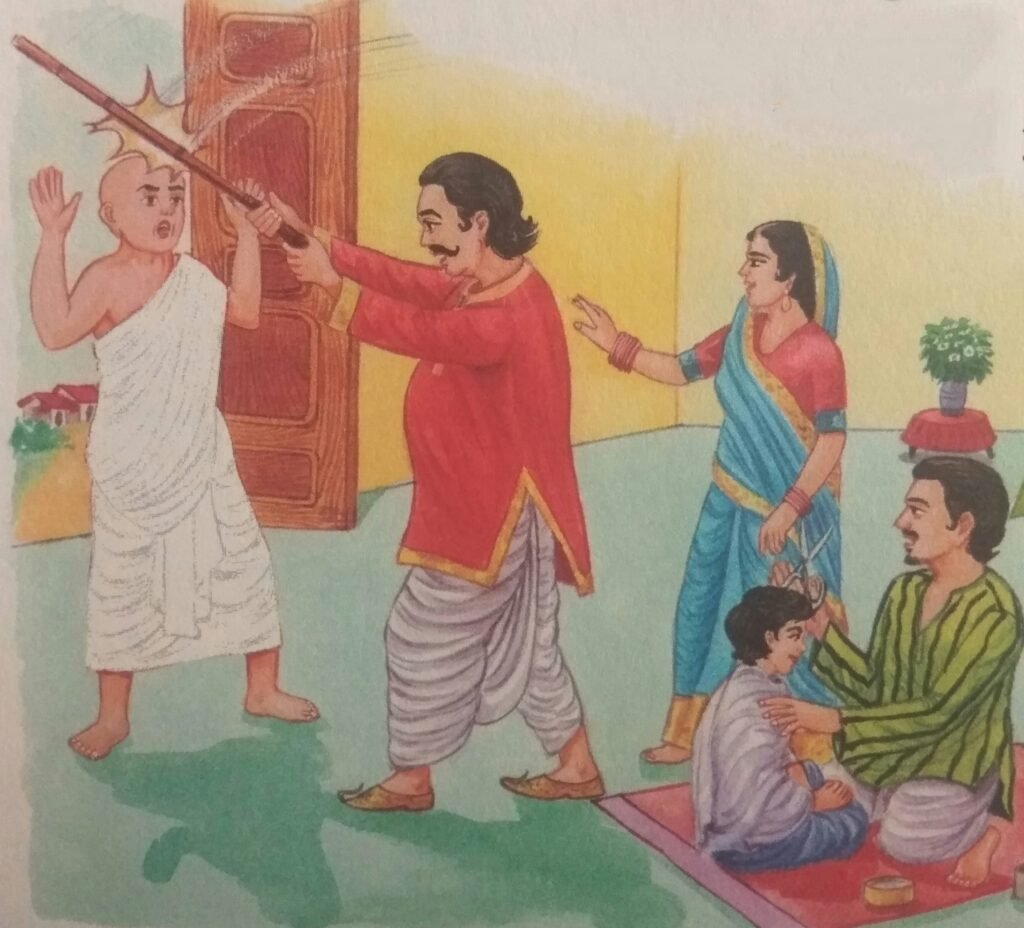
The Barber’s Fatal Formula
Back in the cramped confines of his own shop, the barber, a man named Mani, could not scrub the vision from his mind. It played behind his eyes on a relentless loop: the saint’s serene face, the arc of the club, the blinding flash, the cold, solid gold. But in his retelling of the memory, the nuances were sanded away. He forgot the trader’s prior despair, the divine dream, the specific instruction. His mind, a simple tool for simple tasks, performed a fatal subtraction. He stripped the event of its context and arrived at a grotesque, universal formula: Saint + Blow to the Head = Gold.
The simplicity of it was intoxicating. Why should Vikram, who had already known wealth, be the sole beneficiary of such a secret? The barber’s envy curdled into a resolve as hard as the metal he coveted. He would not just replicate the miracle; he would industrialize it. He would invite not one, but a number of saints. A harvest of gold. He fell asleep dreaming not of enlightenment, but of a mountain of statues, sure that by this method, he would eclipse the trader and become the true jewel of Pataliputra.
A Greedy Man with a Selfish Purpose
The next morning, he rose with the purpose of a man preparing for a sacred festival. He procured not just a club, but a heavy, iron-shod lathi used by guards, a tool meant for breaking, not for divine transformation. He bathed with ritual care, as if washing away his old, impoverished self, and donned his cleanest clothes—a hollow mimicry of piety. Thus sanctified for his avarice, he made his way to a nearby math, a monastery of Jain saints known for their austere, non-violent lives.
In an act of profound hypocrisy, he performed the customary pradakshina, circling the idol of Lord Mahavira three times, his lips moving not in prayer, but in a rehearsal of his lies. He approached the head saint, folding his hands in a show of deference. “Revered one,” he began, his voice slick with false humility, “I seek your blessing. I humbly request that you and all your brothers grace my humble home and allow me to serve you a meal.”
The head saint, his eyes holding the deep quiet of countless meditations, regarded the barber with a gentle but firm gaze. “My son,” he replied, his voice like dry leaves rustling, “your generosity is noted, but it is misplaced. We are wanderers on the path to liberation. We do not sit as guests at feasts. When hunger calls, we walk into the world, and whatever alms the compassionate offer, we accept. We eat but once a day to sustain this body, nothing more, so that the soul may meditate without the burden of desire.”
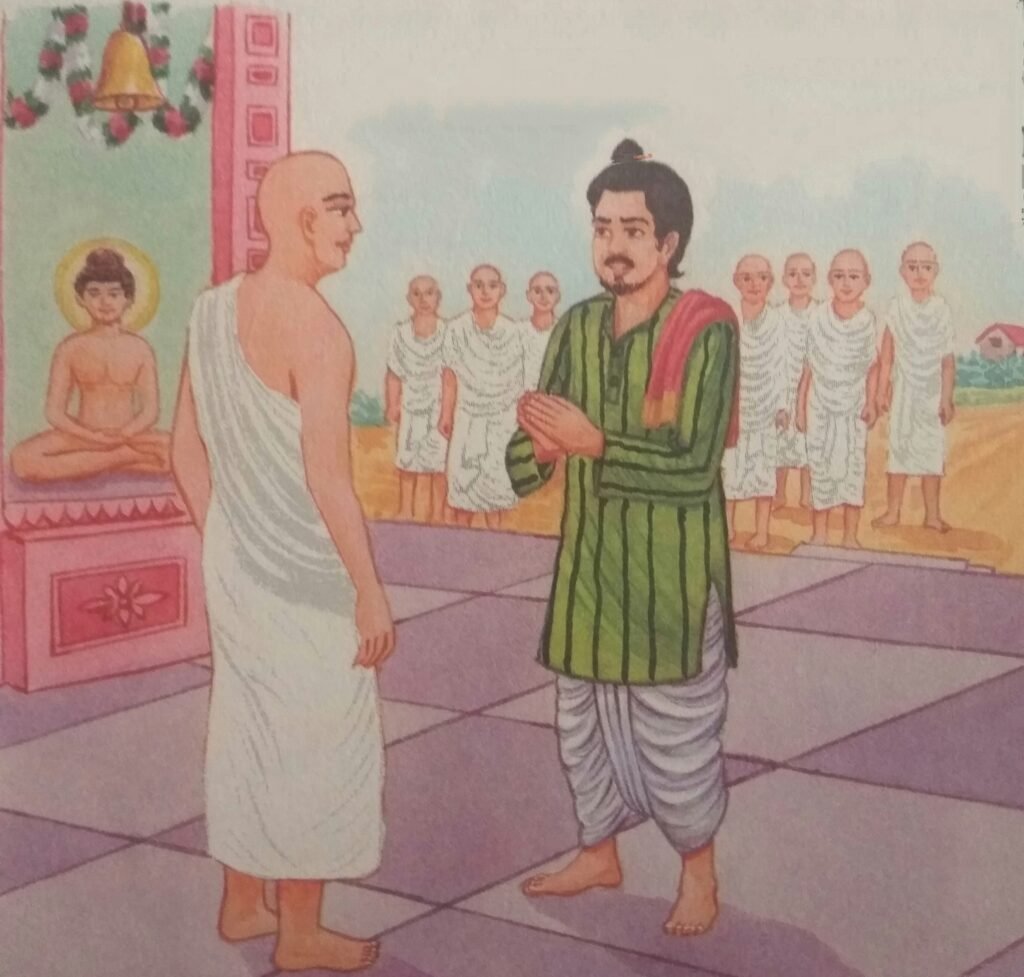
The Harvest of Folly
The barber, Mani, feigned remorse, bowing low to touch the feet of the saints—a gesture that felt like a lie against his own skin. He left the monastery not in defeat, but with a simmering frustration. The saints, in their ethereal wisdom, had refused to walk willingly into his scheme. Very well. He would not be deterred. A new plan began to cohere in his mind, a plan not of invitation, but of collection. It was simpler, more direct. He would gather the gold himself.
When the sun reached its zenith and the city buzzed with the business of the day, Mani took his position outside the monastery’s main gate. He watched as the saints emerged, one by one, their eyes downcast, their bare feet whispering on the hot stones, their wooden bowls held not for wealth, but for simple sustenance. With a predator’s patience, he approached each one. “Revered one,” he would murmur, his voice a well-practiced blend of reverence and excitement, “a humble meal awaits in my home. I beg you, bless my hearth.”
The Sealing and the Slaughter
One by one, drawn by his apparent piety, the saints followed him. He led them into the dim, confined space of his home, the air thick with the scent of oil and hair. As the last white robe crossed his threshold, a terrible finality settled over him. He swiftly closed the heavy wooden door. The bolt, a thick piece of iron, slid into its bracket with a thud that sounded like a tomb sealing shut. For good measure, he fastened a large, brass lock—a final, grotesque confirmation of his intent.
The saints turned, a flicker of confusion passing between them. It was in that moment of silent inquiry that Mani revealed his true purpose. He hefted the iron-shod club. There was no prayer on his lips, no moment of divine connection—only the cold calculus of greed. He did not see serene holy men; he saw statues waiting to be unmade.
He “lost no time.”
The first blow fell not with a chime, but with a sickening, wet crack. There was no flash of light, no gleam of gold. Only a cry, cut short, and the crumpling of a body clad in a white robe. The alarm was immediate, a chorus of shouts and prayers rising in the confined space. But Mani, blind and deaf in his frenzy, moved to the next. The club rose and fell—a terrible, mechanical rhythm. It was not a miracle he was performing, but a slaughter. The floor, which he had imagined would be paved with gold, was instead stained with the profound and tragic red of life, a brutal rebuttal to his foolish, monstrous dream.
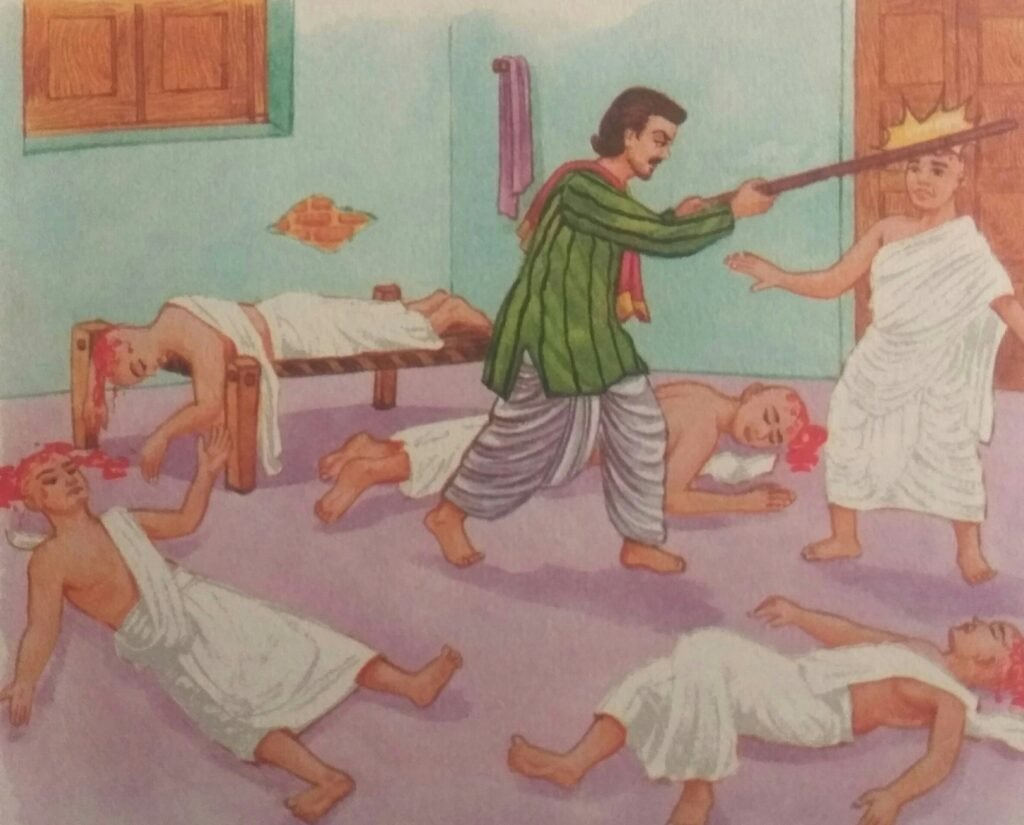
The Reckoning
The cacophony of anguish from within the barber’s home did not simply fade into the air; it became a living thing, a wave of horror that crashed through the quiet lane. The saints’ cries, a sound never before heard in Pataliputra, brought people running from all directions. They gathered outside Mani’s door, a crowd shifting from confusion to dread as the truth of the sounds became undeniable. Someone, their voice trembling, ran for the city guard.
The police officer, a man hardened to the petty crimes of the city, arrived to a scene that chilled him to his core. He demanded the door be unbolted. When a trembling, blood-spattered Mani finally opened it, the officer was met with a vision from a nightmare: the peaceful, mutilated forms of the saints, the air thick with the metallic scent of blood, and the gleaming, unused club lying beside its carnage—a stark symbol of a theory fatally tested.
The Question of “Why”
There was no struggle. The barber was shackled in the very home where he had sought to build a palace of gold. The iron that now cuffed his wrists was the only metal his plan would ever yield. He was cast into a cold, stone cell, the world outside roaring with a unified cry for justice.
The trial was swift. In the solemn silence of the court, before the stern-faced judges, Mani was confronted with the single, devastating question: “Why? What possible reason could you have for such an atrocity?”
The Echo of a Foolish Dream
Mani stood, his mind a barren landscape. To speak of his logic—of the formula of saint and club and gold—was to speak not a defense, but a confession of a profound and dangerous idiocy. The truth sounded like the ravings of a madman, even to his own ears. He stood mute, his greed having robbed him not only of his future but of any explanation for his past. The verdict was inevitable. He was sentenced to death, a fool who had traded his life for a fantasy.
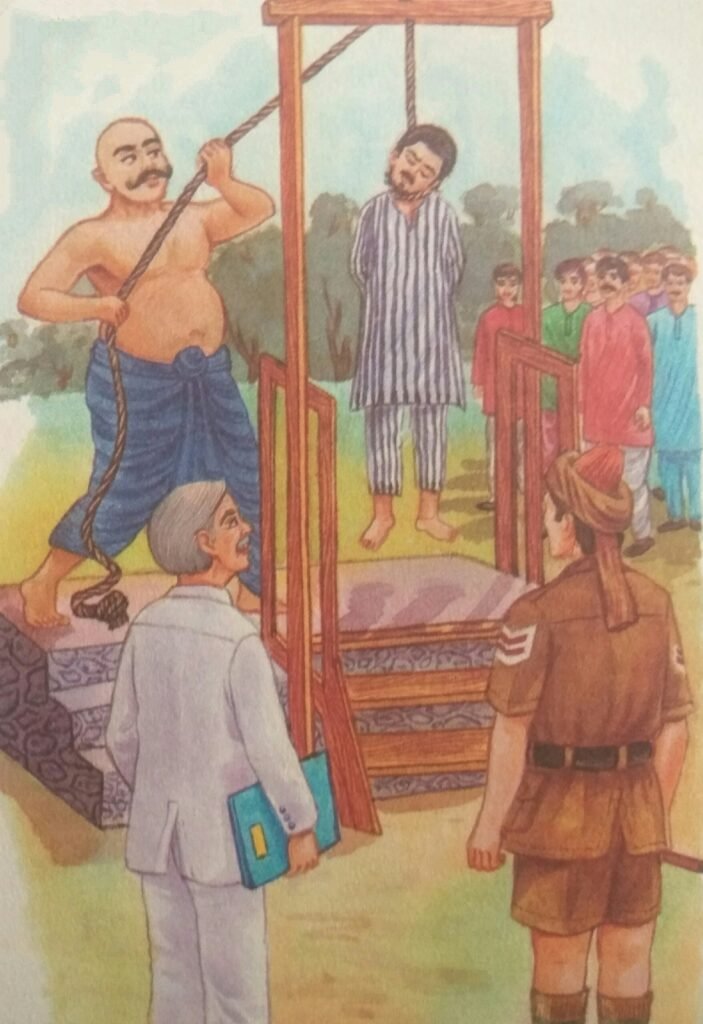
The Moral of the Story
Thus, the foolish barber was not merely punished for his violence, but for the catastrophic failure of his own perception. He saw a sacred mystery and reduced it to a recipe. He witnessed a reward for ancestral integrity and saw only a shortcut for personal avarice.
His story echoes through the ages as a stark warning:
True wisdom lies not in blindly copying an action, but in understanding the context, virtue, and sacredness that made it right. And greed is the poison that blinds us to this truth, transforming hopeful ambition into self-destructive folly.
- 14 Best Panchatantra stories in hindi
- 15 Best Children Stories in English from Panchatantra 2.0
- 16 Best Aesop's Fables in Hindi with moral lessons
- 17 Best Aesop's Fables with moral lessons for children
- Arabian Nights
- Author's Best Written Stories in English
- Author's Best Written Stories in Hindi
- Baital Pachisi बैताल पचीसी in Hindi
- Bedtime Stories for All
- Hindi Love Stories
- Love and Romance
- Vikram and Betal series: Riddle Solving Stories
You can join my WhatsApp Channel by clicking the link here


